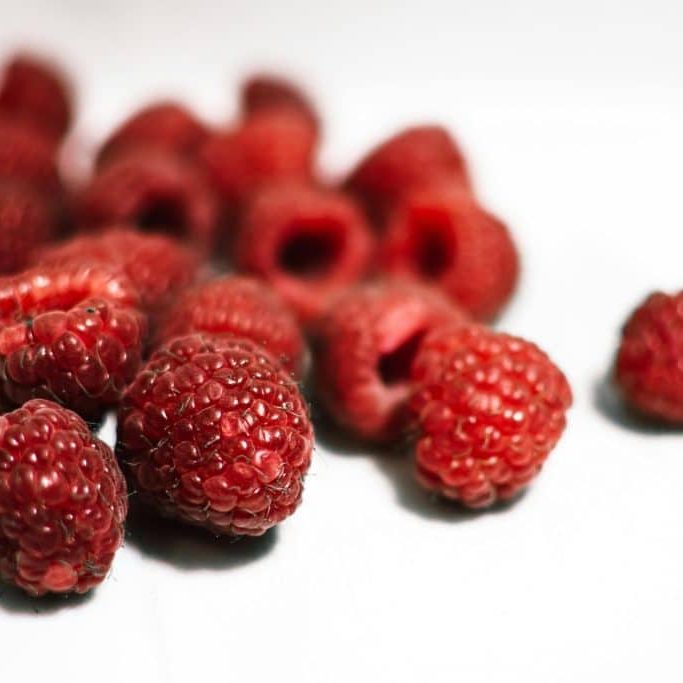Raspberries: Nutrition, Benefits, and How to Eat More
Raspberries are a fiber-packed, antioxidant-rich fruit that supports digestive health, metabolism, and inflammation control. Their tart-sweet flavor and low-calorie profile make them a go-to for fat loss and overall wellness.
Quick Overview
Serving Size: 100 grams (approx. ¾ cup)
| Nutrient | Amount | % Daily Value (DV) |
|---|---|---|
| Calories | 53 kcal | — |
| Carbohydrates | 12.0 g | — |
| Fiber | 6.5 g | 23% |
| Protein | 1.2 g | — |
| Fat | 0.7 g | — |
| Vitamin C | 26.2 mg | 44% |
| Vitamin K | 7.8 µg | 10% |
| Manganese | 0.7 mg | 33% |
Why Raspberries Are So Good for You
Raspberries are loaded with antioxidants and offer more fiber than nearly any other fruit — a nutritional win for blood sugar control, gut health, and appetite regulation. Their low glycemic impact and high volume make them especially effective in fat loss phases.
Health Benefits
1. Powerful Antioxidants
Raspberries are rich in ellagic acid, quercetin, and anthocyanins — compounds that reduce oxidative stress and chronic inflammation.
With 6.5g of fiber per 100g, raspberries support gut regularity and help you feel fuller for longer — making them excellent for satiety and cravings.
Thanks to their high fiber and low sugar content, raspberries are ideal for keeping blood sugar stable, even in low-carb or cutting phases.
4. May Support Longevity
Research suggests diets high in berries like raspberries may reduce the risk of heart disease, neurodegeneration, and metabolic dysfunction.
How to Add Raspberries to Your Diet
- Sprinkle on overnight oats or chia pudding
- Add to protein smoothies for fiber and antioxidants
- Pair with Greek yogurt and a sprinkle of granola
- Use in low-calorie desserts like chia jam or frozen fruit bites
Tailored Coaching Tip:Raspberries are a perfect “volume food” — high in fiber, low in calories, and satisfying when dieting. They’re great for curbing sweet cravings while staying on track.
-
Frozen raspberries are just as nutritious and budget-friendly — ideal for smoothies, baking, or meal prep
-
Pair with protein or fat (e.g., whey protein or almond butter) to balance blood sugar and prolong satiety
-
Use in snacks or post-meal treats to satisfy sweet cravings without overdoing calories
FAQs About Raspberries
Are raspberries keto-friendly?Yes — in moderation. Their high fiber-to-net-carb ratio makes them suitable for many low-carb plans.
Can raspberries improve digestion?Absolutely. Their high fiber content helps promote regular bowel movements and a healthier gut environment.
Final Thoughts
Raspberries are a nutritional powerhouse: fiber-rich, low in sugar, and packed with disease-fighting antioxidants. Whether you’re pursuing fat loss, improving digestion, or just looking to eat smarter, this small but mighty fruit deserves a place on your plate.Want to learn how to fuel your goals with foods like this? Start coaching with Tailored Coaching Method



























































































































































































































































































































































































































































































